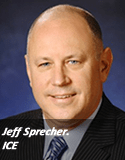Europe’s incoming rules granting open access to clearing houses threaten increased capital requirements for end-users of derivatives, according to Jeffery Sprecher, chairman and CEO of Intercontinental Exchange (ICE).
Speaking on an earnings call last week, Sprecher addressed the open access rules set out in the revised Markets in Financial Instruments Directive (MiFID II), which effectively introduces competition in listed-derivatives clearing.
However, Sprecher believes these rules, as well as the European Market Infrastructure Regulation (EMIR) are on a “collision course” with the implementation of the Basel III capital rules.
Where previously banks were willing to provide their balance sheet to customers in order to monetise the bid-offer spreads from trades, now with the new capital rules, Sprecher believes the banks are becoming more of an “agency model” and are less willing to make their balance sheets available. “That means that capital in those clearing houses are going to have to come from one or two places, either the owner of the clearing house or the end-user.”
Currently, major European listed derivatives clearing venues Eurex and Liffe only offer clearing of their products with their own clearing houses. MiFID II is seeking to open the market and introduce competition, by enabling market participants to choose the clearing house independently of the venue on which they execute.
Yet Sprecher argues investors in ICE will not want to put their capital at risk for the business brought by competitors.
“Shareholders are not going to co-mingle their capital bases to help competitors, which mean that, ultimately, the capital in Europe is going to largely come from the end-users.”
EMIR also sets out rules for segregated accounts, where end-users will be able to deposit funds in a separate account from the clearing house and other members to back their positions. However Sprecher also believes this will have a negative impact on the industry.
“What we’re going to find is that the large institutional fund managers are not going to be able to mutualise their funds with other manager’s funds. So we will be putting into place positions where fund managers will have to capitalise, significantly capitalise individual accounts in order to be able to trade,” he adds.
“Europe believes that’s a good idea… and I guess that they believe that end-users are willing to pay a lot more for that privilege.”
